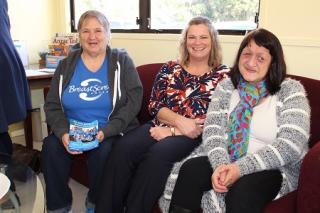- Home
- News
- Screening Matters, Issue 59, August 2017
- Breast screening booklet demystifies mammograms: Northland DHB
News
- Screening Matters Newsletter
- April 2019
- April 2018
- December 2017
- August 2017
- April 2017
- December 2016
- October 2016
- March 2016
- November 2015
- August 2015
- June 2015
- April 2015
- February 2015
- December 2014
- October 2014
- August 2014
- June 2014
- April 2014
- February 2014
- December 2013
- October 2013
- August 2013
- June 2013
- April 2013
- February 2013
Screening Matters
The National Screening Unit newsletter
In this issue:
- Engaging Māori wāhine in conversations: BreastScreen Counties Manukau
- Breast screening booklet demystifies mammograms: Northland DHB
- First District Health Boards start bowel screening
- Delivering quality screening and audiology services for babies
- Launch of Time to Screen social marketing programme
- New BreastScreen Aotearoa resources for women
- Breast and cervical screening support services for Otago and Southland
Breast screening booklet demystifies mammograms: Northland DHB

An Easy Guide to Breast Screening was launched at IDEA Services in Whangarei to help women understand the process of having a mammogram, especially those aged 45 to 69.
Sue Cresswell, a medical radiation technologistat Northland DHB’s Mauri Ora Breast Screening Clinic, said the inspiration for the booklet came from an experience in which a woman with an intellectual disability arrived at the clinic to have her two-yearly mammogram.
Both the woman and her caregiver found the mammogram confusing and distressing because they did not know beforehand what to expect. It became clear there was a need to provide a booklet with the right language and pictures to explain the mammogram process.
The team that developed the booklet included Community coordinator Kelly Leha'uli, Sue Cresswell, Mauri Ora, Breast Screening Clinic operations manager, Barbara Miller, Māori support worker Rebecca Gilbert, and Population Health Strategist Lyn Rostern. Liz Inch from the Communications team took the photos for the storybook.
The team worked with Kim Fuller, a health advisor for IDEA Services, who communicated with IDEA clients and their carers to bring in their perspectives.
Population Health Strategist Lyn Rostern says the booklet could be adapted to demystify a range of hospital procedures. Instead of portraying the mammogram experience, other booklets created from the template might explain to readers what to expect when being given an anaesthesic or having blood taken.
Meeting the needs of health consumers with disabilities is a result of constant engagement with the cross-sector Disability Working Group which provides feedback to Northland DHB’s Disability Support Services, Lyn said.
Cindy Andrews features as the main patient in the booklet and is shown interacting with her local breast screening clinic, from filling in paperwork to sitting in the waiting room to having her mammogram. Cindy said she contributed an important detail to the booklet – a reminder for people like herself to “Keep still, relax and breathe” while having their breast X-rayed – and said she had a good experience during the photo shoot.
The National Screening Unit has approved the pamphlet for distribution and Community coordinator Kelly Leha’uli will now be utilising the resource in education sessions with eligible women and their support team.
To receive the Screening Matters newsletter by email, fill out our sign-up form.

